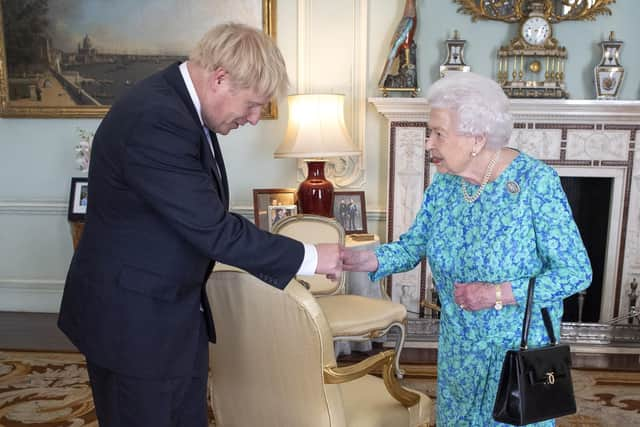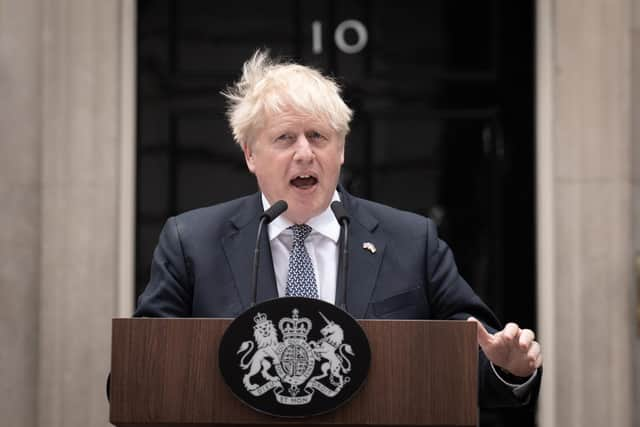Boris Johnson legacy: As the Prime Minister departs, what are the highs and lows of his premiership?
Mr Johnson resigned just two years and 348 days into the job in a tenure mere months longer than his predecessor Theresa May, who he himself forced out.
The Prime Minister leaves able to claim to have got Brexit done, dealt with the Covid pandemic, built diplomatic bridges with Ukraine and won a historic majority.


Advertisement
Hide AdAdvertisement
Hide AdHis opponents may dismiss the Eton-educated MP as a serial liar, but the Prime Minister was, at least briefly, a man who enjoyed success that often defied logic.
He secured a Brexit deal many thought impossible, helped Britain unlock through a world-leading vaccine procurement scheme, and helped co-ordinate the Western response to the Ukraine crisis.
Then there is ‘Partygate’, the Chris Pincher scandal and moral issues that speak to his worst instincts and flexibility with the truth.
For all his flaws, Mr Johnson has done more to leave a mark on British politics in a short time than leaders who secured multiple terms.


But what are the best and worst aspects of his tenure, and how will he be remembered?
Brexit
Regardless of views on the European question, getting a Brexit deal was an achievement Mr Johnson will hope defines his premiership.
Not only did it end months of impasse with the bloc, it also united a Tory party previously fighting itself over what version of Brexit to support.
While getting his own MPs to back the agreement was an achievement, it was his threats of no-deal that helped to force European Union leaders to compromise, albeit only a little.
Advertisement
Hide AdAdvertisement
Hide AdThat's not to say there are not problems, not least with Brexit shrinking the economy by 4 per cent in the long term, compared to 2 per cent from Covid.
On fishing, the industry has been devastated and continues to ask for more support, while there remain lorry queues at Dover.
Then there is the Northern Ireland protocol, which Mr Johnson will be glad is a problem for his successor.
Mr Johnson had promised “no checks on goods going from GB to NI, or NI to GB” and told businesses if they were ever handed paperwork to fill in, they could throw it in the bin.
Brexit was also the issue that helped the Tories win in the so-called ‘Red Wall’ constituencies in working-class parts of the north of England.
Mr Johnson won the battle so strongly even Labour leader Sir Keir Starmer has promised not to take Britain back into the EU single market or customs union.
The outgoing Prime Minister has settled the European question, and delivering Brexit remains the strongest highlight of Mr Johnson’s political career.
Covid
The other defining event of his premiership was linked intrinsically to coronavirus – a disease that put Mr Johnson in intensive care and left more than 180,000 people dead.
Advertisement
Hide AdAdvertisement
Hide AdHis handling of the pandemic overall is hard to judge until the sweeping UK-wide inquiry is undertaken, but there is no doubt the handling of the response boosted Mr Johnson’s popularity.
With almost daily coronavirus briefings, Mr Johnson was seen to lead on the issue, albeit not quite to the level of First Minister Nicola Sturgeon.
His Government delivered vaccines for everyone in the UK and furlough for the majority of workers, meaning Great Britain was therefore able to unlock before any other major European country.
By August 2021, the furlough scheme had supported 1.3 million businesses and 11.6 million jobs, preventing a crisis of mass unemployment.
However, Mr Johnson’s hesitation on imposing a lockdown in March 2020 cost “thousands of lives”, according to the House of Commons’ science and health committee.
He delayed again at Christmas of that year, and the full impact of putting the infected into care homes remains to be seen.
Then there are Mr Johnson’s alleged comments over allowing "bodies (to) pile high in their thousands" rather than impose another national lockdown across the UK.
Denied by Downing Street, they were confirmed by others, including the Prime Minister’s former chief aide Dominic Cummings.
Advertisement
Hide AdAdvertisement
Hide AdWhile certainly some measures during the response to Covid were a high of his premiership, there were always things in the background detracting from it.
Partygate
Unfortunately it is impossible to think of the Covid response and not consider ‘Partygate’ – a series of scandals that helped bring Mr Johnson down.
A total of 126 fines were issued to 83 individuals for breaking Covid rules in Downing Street, something that happened under Mr Johnson’s watch between May 2020 and April 2021.
Named Operation Hillman, the investigation by the Metropolitan Police took nearly four months and cost about £460,000.
Fined for attending parties, Mr Johnson is under investigation for misleading the house by saying he knew nothing about them.
And Lord Pannick, the lawyer hired by the UK Government, has since claimed the inquiry into whether Mr Johnson misled MPs over Partygate is "unfair" and "fundamentally flawed".
Mr Johnson’s denials when he attended events was made worse by a soft touch to his allies, defending both Mr Cummings and former health secretary Matt Hancock for their own breaches.
Mr Cummings drove to Barnard Castle during lockdown with Covid symptoms, while Mr Hancock had an affair in his office.
Sleaze
Advertisement
Hide AdAdvertisement
Hide AdThere were yet more scandals with the Owen Paterson affair, when Mr Johnson tried to save the former Northern Ireland Secretary of State from suspension by overhauling the Parliamentary standards system.
Mr Paterson made a “serious breach” of the rules by meeting with ministers on behalf of a company and not declaring his interests.
Following a huge backlash, the Government U-turned and Mr Paterson resigned.
This, along with Mr Pincher resigning over sexual harassment allegations, left Mr Johnson without authority.
Mr Pincher is alleged to have made unwanted sexual advances to another MP in 2017, and assaulted two more in June of this year.
It was mistakes away from policy that brought Mr Johnson down, with the Prime Minister denying he knew of specific complaints when he did before appointing Mr Pincher as deputy chief whip.
Mr Johnson’s response when his allies were in trouble was a clear low of his tenure, and one that ultimately contributed heavily to his downfall.
Ukraine
Mr Johnson will hope his defining legacy is on Ukraine, where he promised to maintain high levels of defence spending, without giving a figure.
Advertisement
Hide AdAdvertisement
Hide AdThe Prime Minister’s decisive response and strong rhetoric on Ukraine has made him a hero in the country and grown his reputation abroad.
Ukrainian president Volodymyr Zelenskyy referred to Mr Johnson as such last month. A street in Ukraine has been named after Mr Johnson to honour his support.
Just days before his resignation, Mr Johnson urged Nato countries to honour their commitment to spend a minimum of 2 per cent of gross domestic product on defence, and the Prime Minister has vowed to be involved even after he leaves office.
The response has in part led to the energy crisis, but Mr Johnson insists better days are coming.
For a man so obsessed with legacy, Ukraine presents a new crisis to focus on, and a way to continue this legacy despite no longer leading Britain.
Domestic policy
Despite a historic majority, Mr Johnson’s domestic policy is sorely lacking and a clear low of his premiership.
Tory MPs have spent the past year desperate for the Government to do something, with some suggesting Mr Johnson wanted to be Prime Minister solely so he could say he had been.
Mr Johnson broke his 2019 manifesto pledge not to raise taxes by announcing that National Insurance Contributions would rise by 1.25 percentage points from April 2022.
Advertisement
Hide AdAdvertisement
Hide AdHis promise of 40 new hospitals never came to fruition and, despite renaming a department ‘Levelling Up, money is still not being evenly distributed and there is still a housing crisis.
While Covid was a factor, many of his own MPs have voiced their views to The Scotsman that Mr Johnson’s domestic record was a disappointment.
The self-appointed minister for the Union also struggled in Scotland, with the leader of the Scottish Tories, Douglas Ross, twice calling for him to go.
Breaking up his own ‘Union Unit’, Mr Johnson was hesitant to visit Scotland, and Tory MPs north of the border felt he was a hindrance to their electoral chances.
The internal market bill has made the UK Government able to invest directly in Scotland while bypassing Holyrood, but it did not directly lead to any electoral boost for the Scottish Tories.
Comments
Want to join the conversation? Please or to comment on this article.

